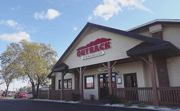Once known for Its rough past, this Maine Town is now a real estate hotspot
- Replies 0
Some places undergo such a steady yet dramatic evolution over the years that those who have called them home for decades may find themselves struggling to recognize the streets, buildings, and rhythms that once felt so familiar.
What was once an overlooked and even unpleasant town has now become one of the most sought-after spots in the region.
A boom in property values has brought fresh opportunities and unexpected challenges for the people who live there.
The transformation in these areas has unfolded at a pace rapid enough to spark a mix of eager anticipation for what’s to come and a lingering unease about what might be lost along the way.
In the 1970s, Rockland, Maine, had one of the highest crime rates in the state, which is otherwise known as one of the safest in the country.
By the 1980s, a herring rendering plant in the centre of town gave off a constant, overpowering odour.
Over the years, industry was replaced by art galleries, restaurants and a more traditional vacation-town feel. These changes drew new residents and visitors, slowly setting the stage for today’s property surge.
Joan Merriam, a former schoolteacher, bought land on Rockland’s south end 15 years ago to retire where she grew up. She added a modular home, and together the property was worth about $200,000 at the time.

This summer, after Rockland’s first property revaluation in 20 years, her property’s value doubled. For many residents, higher values mean pride—but also the worry of bigger tax bills.
While some residents welcome bustling streets and a thriving creative scene, those on low or fixed incomes fear they might be priced out.
Merriam says at least two homes near hers are now up for sale because older owners are afraid of tax hikes.
She can still manage her own payments, but it is tight. Others in nearby towns like Camden have already struggled with similar revaluations.
Also read: Retire in Paradise: The Overseas Haven with Elite Healthcare, Low Taxes, and Luxury Living!
Critics say revaluations should be done more regularly to prevent sudden financial shocks. Former assessor’s agent Jim Murphy told the Belfast City Council that infrequent updates have been “taxing people out of their homes.”
He called the impact “tragic, in some cases,” after Belfast’s first revaluation in over two decades. Residents in Bucksport, another coastal town, report their tax bills have doubled or even tripled in recent years.
One of the main reasons for these jumps is the loss of major industries that once made up a large share of local tax bases.
Bucksport’s Verso Paper Mill closed in 2014, removing 40 percent of the tax base. The town had saved $8 million to soften the blow, but those reserves are now running out more than a decade later.
Also read: Top 10 states where retirees will score big raises in 2025—Are you on the list?
Officials are trying to attract new industries while maintaining essential services. Merriam says Rockland’s new wave of residents has brought art, education and energy to the community.
She acknowledges that the changes have benefits, but housing is becoming harder to find for teachers, police officers and other local workers.
“I feel like the people that have lived here for generations feel like they don’t have as much say,” she said. The challenge now is to keep the town vibrant without losing the people who shaped its identity.
Read next: These hidden havens across the US are perfect for your next quiet escape

Have you seen property values change in your own community—and if so, was it for better or worse? Share your thoughts in the comments, and tell us how your town is managing the balance between growth and affordability.
What was once an overlooked and even unpleasant town has now become one of the most sought-after spots in the region.
A boom in property values has brought fresh opportunities and unexpected challenges for the people who live there.
The transformation in these areas has unfolded at a pace rapid enough to spark a mix of eager anticipation for what’s to come and a lingering unease about what might be lost along the way.
In the 1970s, Rockland, Maine, had one of the highest crime rates in the state, which is otherwise known as one of the safest in the country.
By the 1980s, a herring rendering plant in the centre of town gave off a constant, overpowering odour.
Over the years, industry was replaced by art galleries, restaurants and a more traditional vacation-town feel. These changes drew new residents and visitors, slowly setting the stage for today’s property surge.
Joan Merriam, a former schoolteacher, bought land on Rockland’s south end 15 years ago to retire where she grew up. She added a modular home, and together the property was worth about $200,000 at the time.

Once known for Its rough past, this Maine Town is now a real estate hotspot. Image source: Tierra Mallorca / Unsplash
This summer, after Rockland’s first property revaluation in 20 years, her property’s value doubled. For many residents, higher values mean pride—but also the worry of bigger tax bills.
While some residents welcome bustling streets and a thriving creative scene, those on low or fixed incomes fear they might be priced out.
Merriam says at least two homes near hers are now up for sale because older owners are afraid of tax hikes.
She can still manage her own payments, but it is tight. Others in nearby towns like Camden have already struggled with similar revaluations.
Also read: Retire in Paradise: The Overseas Haven with Elite Healthcare, Low Taxes, and Luxury Living!
Critics say revaluations should be done more regularly to prevent sudden financial shocks. Former assessor’s agent Jim Murphy told the Belfast City Council that infrequent updates have been “taxing people out of their homes.”
He called the impact “tragic, in some cases,” after Belfast’s first revaluation in over two decades. Residents in Bucksport, another coastal town, report their tax bills have doubled or even tripled in recent years.
One of the main reasons for these jumps is the loss of major industries that once made up a large share of local tax bases.
Bucksport’s Verso Paper Mill closed in 2014, removing 40 percent of the tax base. The town had saved $8 million to soften the blow, but those reserves are now running out more than a decade later.
Also read: Top 10 states where retirees will score big raises in 2025—Are you on the list?
Officials are trying to attract new industries while maintaining essential services. Merriam says Rockland’s new wave of residents has brought art, education and energy to the community.
She acknowledges that the changes have benefits, but housing is becoming harder to find for teachers, police officers and other local workers.
“I feel like the people that have lived here for generations feel like they don’t have as much say,” she said. The challenge now is to keep the town vibrant without losing the people who shaped its identity.
Read next: These hidden havens across the US are perfect for your next quiet escape
Key Takeaways
- Some places change so much over the years that longtime residents barely recognise them. In the 1970s, Rockland, Maine, had one of the highest crime rates in the state, and by the 1980s, a herring rendering plant in town emitted a constant odour. Over time, industry gave way to art galleries and restaurants, drawing new residents and visitors.
- Rockland’s first property revaluation in 20 years caused values to double for some, like former schoolteacher Joan Merriam, whose property rose from about $200,000.
- While some welcome the creative energy, others on fixed incomes worry about affording higher taxes. Critics like former assessor’s agent Jim Murphy say infrequent revaluations “tax people out of their homes.”






